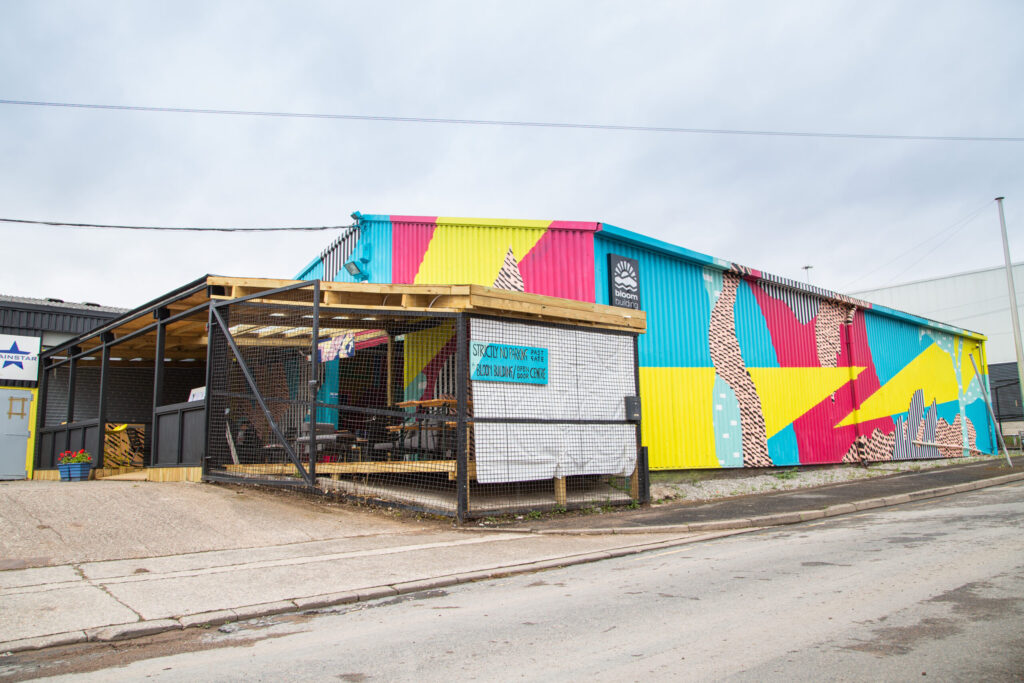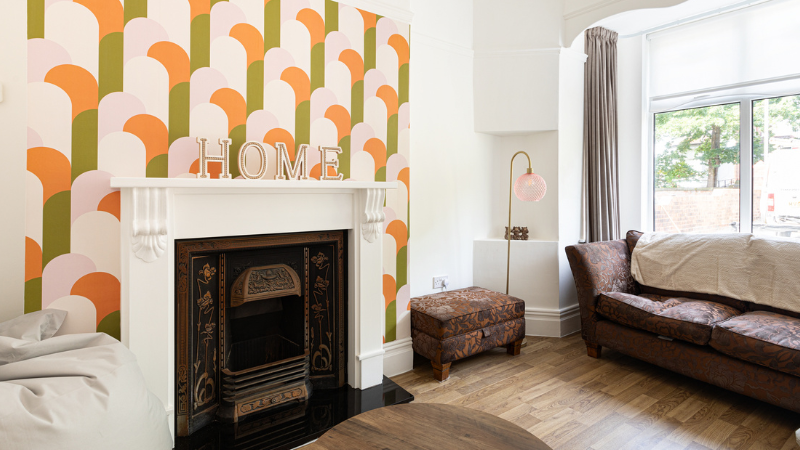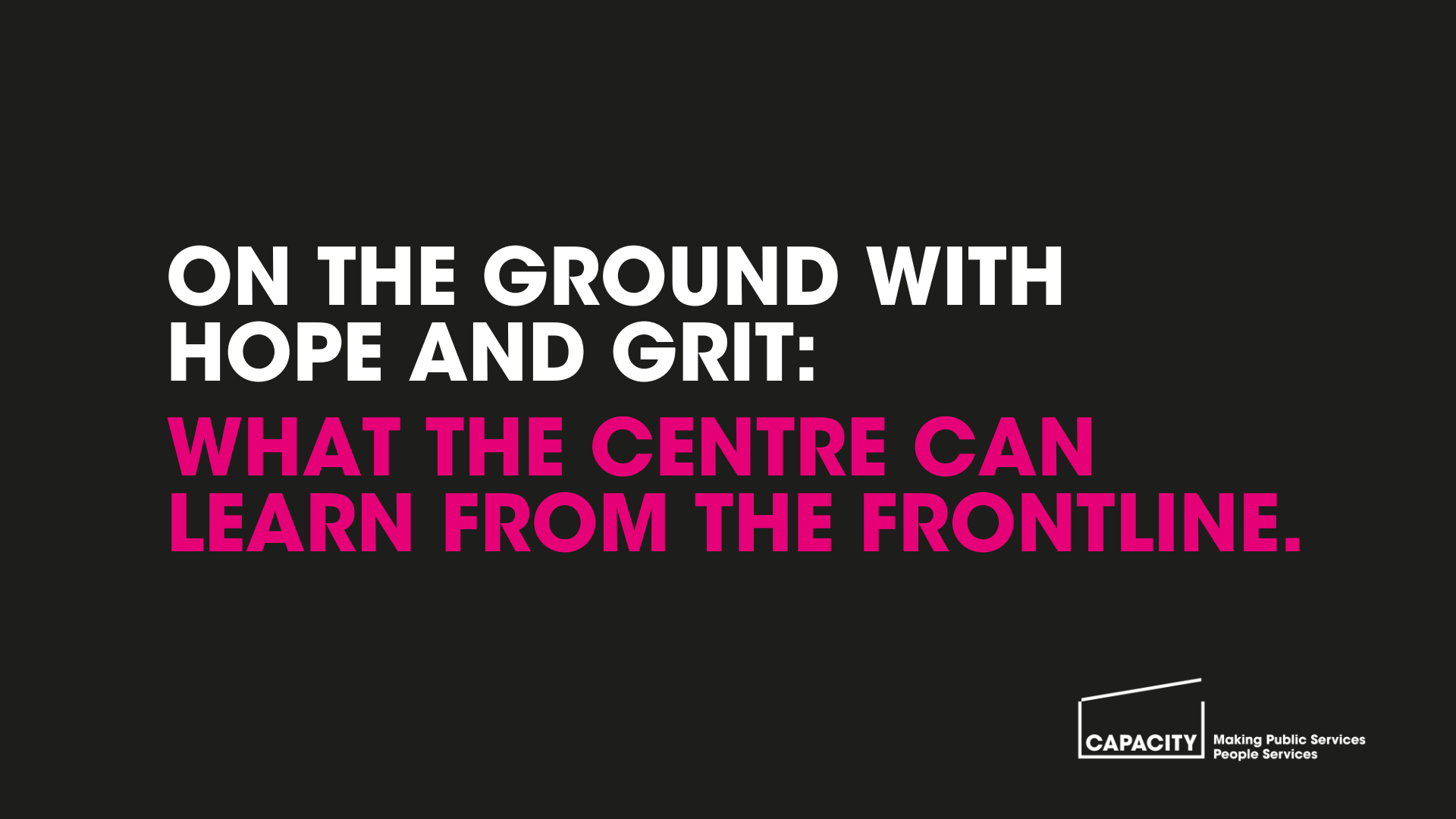Last week, we hosted a visit by Nick Kimber, Emily Braid and David Atkinson from the Cabinet Office Public Service Reform team. It was a chance to show the team some of what’s happening in the City Region. Here’s some of what we saw, heard, and felt. Because honestly? There’s something really powerful happening locally – and it’s worth paying attention to.
Wirral: putting trust before targets
We started the day at Open Door, a mental health and well-being charity designed by young people, for young people. The space is bright, welcoming and the opposite of institutional. They’re qualities that could be used to describe our hosts – Elizabeth Hartley (Wirral’s Director of Children’s Services), Jo Leek (Investment Manager at the Combined Authority) and Open Door’s ever-passionate Alex and George.
It set the tone for the day and gave us the opportunity to reflect on innovation in Wirral – Family Toolbox, Branch, Open Door, Cradle to Career, Families First. These aren’t just projects. They’re shifts in how help is offered and experienced. Much of it championed by Elizabeth.
“I’ve got a mission for the third sector to thrive – it’s where I’m from, I get it, not everyone does. How do we help others see it too?“
Elizabeth and her team (with political buy-in) didn’t wait for permission to rewrite the rules – they got on with it. Early Help contracts without KPIs. Families who used to avoid knocks on the door now referring their neighbours to services. Teams rooted in communities, not stuck behind desks. Public services in the background, enabling rather than directing. Putting trust and relationships at the heart of Wirral’s approach. It’s a reality, and it’s working.
The number of looked-after children in Wirral now aligns with statistical neighbours – not because of top-down policies, but because Elizabeth and her team were given time to listen, test, and learn. Her former boss, Paul Boyce, gave her two years of space. Two years. That’s the kind of patience we need more of.
George shared plans for Joy, a new space Open Door is developing, bringing together bold thinkers in mental health and culture to create something that feels different. Something that feels… human.
“How do you find people earlier?” It was a question from Nick’s team that goes to the heart of preventative public services. Alex’s answer was spot on: “Through the partnerships that exist locally.” In Wirral, groups like Future in Mind and the Youth Collective (200+ orgs strong!) are already doing the work. Self-organised, cross-sector, and embedded in their places.
So what could the centre do to help?
- Unblock digital: Local and regional teams need better tools and systems to see and share info. It’s tough and essential.
- Longer-term budgets: Innovation takes time. Quick wins aren’t always real wins.
- Create breathing space: Space to listen, test, and learn. That’s what led to the most effective shifts.
- Re-think how we inspect: Elizabeth’s had six inspections since April 2024. That’s a huge time and emotional load. What if we also measured trust, relationships, and outcomes that matter to families?

Open Door is a mental health and well-being charity designed by young people, for young people.
Juno: trying to make life everything it can be
Next stop: Juno. A network of not-for-profit children’s residential homes set up by Capacity in 2023. It’s humbling to see what the Juno team has created. Homes where children are growing up feeling safe, supported and loved. But we heard about the challenges in building something new and trying to make life everything it can be for children in care.
- Regulation is necessary – it keeps kids safe. But registering new homes takes far too long. In some cases, the process becomes so burdensome that it delays innovation rather than safeguarding young people.
- Safety is essential – but so is joy. Juno is building homes where young people feel protected and where they can experience happiness, belonging and love. That balance is often missing from the national conversation.
- Juno’s story of investment was hard-won. Backing new ideas – especially those without a long evidence trail – remains the exception, not the norm. The current system still rewards what’s measurable over what matters.
“If we only back what’s already proven, we shut the door on the new”
That points to a bigger issue. How we define value for money, particularly central government, makes it difficult to support innovative, people-centred work. The frameworks for decision-making are cautious by design, favouring short-term certainty over long-term transformation. But real change is messy. It doesn’t always fit neatly into business cases.
- Risk is unavoidable, but it can be shared. If central government wants to see bold, place-led change, it has to rethink how it judges risk and value. That means listening to local context, trusting local leaders, and giving them the space to tell the whole story not just what fits on a spreadsheet.
- Finally, people matter most. What we heard from the Juno team was loud and clear. We need a workforce strategy for care that recognises the value of brilliant, skilled adults who support young people day in and day out. Right now, finding the right person can still feel like a stroke of luck. That’s not good enough – for the young people or the workers. Developing and sustaining a thriving care workforce should be a regional priority – for human, social, and economic reasons.

Juno is creating homes where young people feel safe, loved and supported.
Sefton’s radical rethink
Last stop of the day was Sefton. Phil Porter (Chief Executive) and Wayne Leatherbarrow (Assistant Director – Strategic Support) shared how they’re rebuilding from an ‘inadequate’ rating to something hopeful and whole. Their approach? The Sefton Way – not departments in silos, but one team across the council, working for people.
One standout example – ‘Team Around the School’. A simple idea done well – wrap services around schools to support where children already are and catch issues early.
Early results show fewer children entering care. But here’s the thing: this only works because it’s been able to run alongside existing services. That kind of double running can feel like a luxury – especially in today’s funding climate – but in reality, it’s essential.
Why? Because it gives space to test new approaches without putting families at risk. It allows teams to learn, adapt, and prove what works before scaling. It builds confidence – both within the system and politically – that we’re not just cutting or replacing, we’re evolving.
Without this buffer, innovation becomes a risk rather than an opportunity. With it, we build the evidence and trust needed to do things differently. So yes – it might feel like a luxury, but if we’re serious about real change, it’s the cost of doing transformation safely and well.
Barriers to more of this?
- Years of cuts have eroded capability for this type of collaborative, place-based work.
- No clear pipeline to grow the next generation of this kind of leadership.
- Central government and local government need to be more honest with each other – drop the vagueness, keep it real.
- Trust sets the pace. Command-and-control habits still linger – we need new ways of working in our muscle memory.
- Innovation needs incentives. Leaders need backing.
One region, one mission
Toward the end of the day, we were joined by Erika from Kindred, along with Rob and Caroline from the Office of Public Service Innovation (OPSI) based in the Liverpool City Region.
Kindred is a values-led investment and support organisation that backs socially trading organisations – community businesses that reinvest in their places and people. But Kindred is more than funding – it’s about creating the conditions for shared growth. Erika spoke passionately about shifting the dynamic from competition to collaboration. It’s a philosophy that runs through everything they do – sharing resources, learning, and power to build a stronger, more resilient social economy.
OPSI is a new opportunity focused on unlocking innovation across public services in the Liverpool City Region. Rob and Caroline are helping to build the infrastructure that supports local areas to test, learn, and scale what works. Their mission is to create a space where public servants can try new approaches, with the safety, support, and strategic backing to move beyond small pilots and into long-term change. They’re asking: What does it take to embed innovation, not as a one-off, but as a way of working? Most importantly, how can we make that change stick?
As the day drew to a close, we found ourselves in a really valuable space reflecting together as a group on the role of local, regional, and central government in creating the conditions for more of what we’d seen and heard. Everyone around the table agreed – taking time for a shared head scratch like this is rare, but so necessary.
Elizabeth, Phil and Wayne were crystal clear about where they excel, and just as clear about where they don’t want interference. The message? Trust us to lead in our places. We know our communities. We’re already innovating. What we need isn’t instruction – it’s space, time, and backing.
Nick, Emily and David came to listen and understand where and how national levers might be unintentionally getting in the way. There was an honest acknowledgement that if we want to scale local innovation, we need fewer hoops, not more.
Sitting in between was OPSI and the broader role of regional working. Rob and Caroline are right in the middle of designing what this could look like. There was both support for what they’re doing – acting as convener, connector, catalyst – and some useful challenge too. Because convening alone isn’t enough. The opportunity here is to create the conditions for local leaders to lead. To help unlock the resources, networks, and permissions that make long-term, place-based innovation possible.
Their shared message? It’s not just about doing more together, it’s about changing how we work together. Slower sometimes, messier often, but ultimately more enduring, more human, and more rooted in place.
My reflections
What struck me most from the day wasn’t just the quality of the work – it was the clarity of purpose behind it. These weren’t isolated good news stories. They were signals of a wider shift already in motion. And that shift is being led by people who are deeply rooted in their communities, backed by local relationships, and fuelled by a real sense of responsibility.
They’re not waiting for permission, they’re getting on with it.
Looking back on the day, here’s what really landed…
- People are the difference. Every conversation, every project we saw, was being driven by passionate, grounded people doing the hard, human work of change. That’s where transformation starts, not with strategy documents, but with relationships.
- Early help works. Frontline teams with real examples of families staying together thanks to early help. That’s not small stuff, that’s lives changed. It’s also a reminder: we already know what works. We don’t need more pilots. We need the courage and headroom to go further with what we’ve already proven.
- Trust isn’t fluffy. It came up again and again. Trust between services and communities, trust between tiers of government, trust within teams. When it’s there, things move. When it’s not, even the best ideas stall.
- Double running isn’t a luxury – it’s an investment. Whether it’s early help, school-based teams, or new residential models, the only way to shift systems safely is to give them space to evolve. That means backing new approaches alongside the old, not in place of them, at least at first.
- The centre doesn’t need to lead, it needs to enable. Local teams don’t want to be left alone, but they don’t need to be told what to do either. The biggest support central government can offer right now? Unblock the blockers. Extend the runway. Create space to breathe, test, and learn.
And honestly? We only scratched the surface. There’s so much more happening across the region. People creating change, quietly and confidently, often under the radar. If one day could spark this much reflection, imagine what we’d learn if we stayed longer, listened deeper, and connected the dots more intentionally.
There’s serious momentum building in places like Wirral, Sefton, and beyond. These aren’t just bright spots – they’re part of a growing ecosystem of change, where the common thread is hope matched with hard graft. The potential here is huge, but no one can do it alone. If we’re serious about change, then let’s back the people who are already leading it, not with another set of KPIs, but with trust, time, and real support.
Because the future of public services is already being built. Quietly. Boldly. Locally.
Let’s make sure it sticks.


